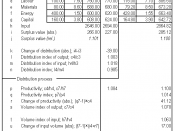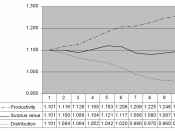Productivity Paradox Introduction The Productivity Paradox put simply is that investments in IT show no evidence that there will be an increase in productivity. Proponents of this statement claim that investments in IT have not produced significant improvements in industrial productivity. If this is true then the information technology revolution of the past 20 years has in effect been a waste of time. Executives, consultants, vendors, and educators may face a complete and total rethink of how to approach the management of IT. This has caused many debates and many stances on the topic. One professor Robert Solow quipped, "We see computers everywhere but in the productivity statistics." Consideration must taken in developing an understanding of the IT impact on the overall performance of an organization. IT provides much more than conventional inputs and outputs. Many improvements in productivity are in the quality, convenience, reliability, timeliness, safety, flexibility, and variety of the product and service.
These variable measurements of productivity are not straight forward. Reasons being many of these benefits are intangible and cannot be directly accounted for in the old-world industrial economics and thus have brought this paradox to the arena of discussion. Discussions by forefront thinkers on the Production Paradox Strassmann and Brynjolofsson have reiterated this point and have also put forward different productivity measures to take account for the variety of benefits IT can have.
What causes this perceived productivity paradox? Some possible answers could be (according to Brynjolofsson 1993): "à ¾ÃÂë The inputs and outputs (the main components of the productivity equation) are wrongly measured and calculated. That is that traditional economic indicators fail to truly capture the correct answer in the new information driven economy. Thus leading to false results and an untrue painting of the real picture. In other words The Production Paradox is analyzing...


